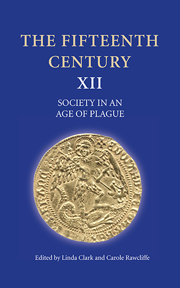Book contents
- Frontmatter
- Contents
- List of Illustrations
- Contributors
- Preface
- Abbreviations
- Introduction
- Looking for Yersinia Pestis: Scientists, Historians and the Black Death
- Pestilence and Poetry: John Lydgate's Danse Macabre
- Pilgrimage in ‘an Age of Plague’: Seeking Canterbury's ‘hooly blisful martir’ in 1420 and 1470
- An Urban Environment: Norwich in the Fifteenth Century
- Mid-Level Officials in Fifteenth-Century Norwich
- Leprosy and Public Health in Late Medieval Rouen
- Plague Ordinances and the Management of Infectious Diseases in Northern French Towns, c.1450–c.1560
- The Renaissance Invention of Quarantine
- Coping with Epidemics in Renaissance Italy: Plague and the Great Pox
- The Historian and the Laboratory: The Black Death Disease
- Index
- CONTENTS OF PREVIOUS VOLUMES
Introduction
Published online by Cambridge University Press: 05 September 2013
- Frontmatter
- Contents
- List of Illustrations
- Contributors
- Preface
- Abbreviations
- Introduction
- Looking for Yersinia Pestis: Scientists, Historians and the Black Death
- Pestilence and Poetry: John Lydgate's Danse Macabre
- Pilgrimage in ‘an Age of Plague’: Seeking Canterbury's ‘hooly blisful martir’ in 1420 and 1470
- An Urban Environment: Norwich in the Fifteenth Century
- Mid-Level Officials in Fifteenth-Century Norwich
- Leprosy and Public Health in Late Medieval Rouen
- Plague Ordinances and the Management of Infectious Diseases in Northern French Towns, c.1450–c.1560
- The Renaissance Invention of Quarantine
- Coping with Epidemics in Renaissance Italy: Plague and the Great Pox
- The Historian and the Laboratory: The Black Death Disease
- Index
- CONTENTS OF PREVIOUS VOLUMES
Summary
At first the sky weighed down upon the earth,
Black and unbroken, and the clouds shut in
Exhausting heat. Four times the crescent moon
Filled her round orb, four times from her full orb
She shrank and waned, and all that weary while
The hot south wind blew furnace blasts of death.
The vile infection spread, as all agree,
Through springs and pools …
The doom weighed heavier as the plague attacked
The wretched farmfolk and gained mastery
Within the city walls.
Ovid's description of the punishment inflicted upon the people of Aegina by Juno, in a fit of pique because they named their city after her rival for Jupiter's affections, ranks, along with Thucydides' celebrated account of the Athenian plague of 430–26 BC, as one of the great set-piece descriptions of pestilence. It has been regarded as a ‘prototype’ for an emerging genre that eventually gave rise to Defoe's Journal of the Plague Year, and it clearly made a profound impression upon the monastic chronicler, Thomas Walsingham. He refers to the ‘furnace blasts of death’ borne on southerly winds when recording the devastating effects of the 1407 plague upon the people of London, 30,000 of whom reputedly died during what was to become a national epidemic. Independent evidence suggests that this ‘deadly plague’ did, indeed, cause widespread mortality, although, like many other fifteenth-century outbreaks, it has received considerably less attention than those of the late fourteenth century and early modern period.
- Type
- Chapter
- Information
- The Fifteenth Century XIISociety in an Age of Plague, pp. 1 - 14Publisher: Boydell & BrewerPrint publication year: 2013



